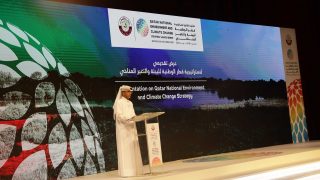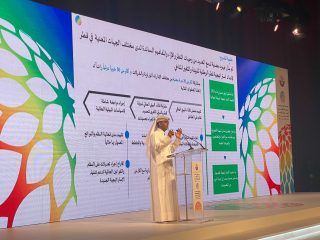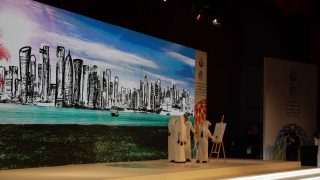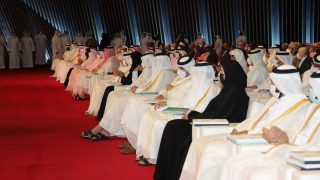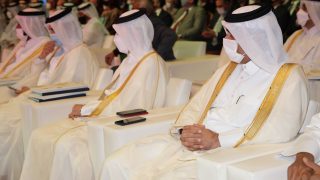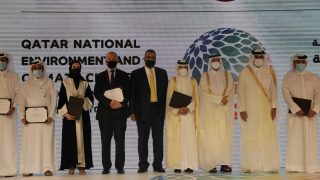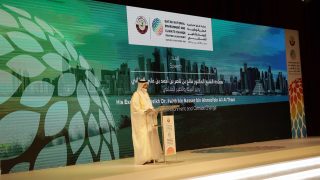Authorities in Doha announced a major Climate Change Action Plan to reduce emissions produced by the Gulf state.
Qatar is set to reduce around 25 percent of its greenhouse gas emissions by 2030, authorities announced on Thursday.
The greener target is part of the Gulf nation’s newly launched ‘Climate Change Action Plan,’ announced during a press conference in the Qatari capital on Thursday.
The plan is set to take Qatar closer to achieving its sustainable development goal by 2030 — which also falls in line with its overall 2030 National Vision and national development strategy.
“Qatar considers climate change to be one of the biggest challenges of our time, which calls for urgent and dedicated measures at the local, regional and global levels,” Environment Minister Abdulla bin Abdulaziz bin Turki Al Subaie said at the presser.
“The NCCAP is built on strategic plans for economic diversification set out in the Qatar National Vision 2030, the National Development Strategy and is aligned with United Nations Sustainable Development goals,” he added.
In 2019, greenhouse gas emissions were 109.9 MT CO2 eq.
If no action is taken, emissions would increase by 33% by 2030 as a result of increased global demand for natural gases and rising population. Factors that lead to such significant emissions include Qatar’s Northfield expansion project, power generation and water desalination as well as, most importantly, transportation.
However, Doha’s commitment to a greener environment and combating climate change has in recent years pushed authorities to develop a strong policy to reduce emissions and enhance sustainability.
As part of its newly launched national climate change plan, Qatar will cut 25 percent in its greenhouse gas emissions and carbon intensity of its liquified natural gas facilities in the next eight years.
The 25 percent reduction would equal to a 37 Mat CO2 eq dip by 2030, according to national figures, and will include various sectors such as oil and gas, power and water, transportation and construction.
This will be achieved by employing a variety of policies and levers, including activities of stakeholders-institutions, corporations, and private citizens.
In addition, to ensure accuracy and success, the plan identifies 36 mitigation measures and over 300 adaptation measures.
Several programmes and initiatives will be taken across various sectors, including economy, healthcare, biodiversity, water management and infrastructure.
“NCCAP sets a clear roadmap on how Qatar will meet its international commitments to help fight the causes and mitigate the effects manmade climate change, and in particular to reducing emissions of greenhouse gases,” said Deputy Prime Minister and Minister of Foreign Affairs Sheikh Mohammed bin Abdulrahman Al Thani at the press conference on Thursday.
“Qatar will spare no effort in achieving its desired role in facing the serious threat of climate change,” he added.
The Gulf nation has engaged in major efforts to boost sustainability and environment preservation with several policies and plans ahead of the much-awaited World Cup 2022.
This includes the execution of major projects in infrastructure and transportation that follow the highest international standards.
Earlier this month, Qatar established an environment and climate change ministry to tackle the global issue.
A report by the Arab Youth Climate Movement Qatar published earlier this month highlighted pivotal changes in the Gulf state’s greenhouse gas emissions over the span of 21 years.
The Qatar’s National Emissions Inventory document, which looks at statistics from 1998 to 2019, noted Qatar’s total greenhouse gas emissions were recorded to be 116.2 million tonnes (Mt) of carbon dioxide equivalent (CO2-e) in 2019.
2019’s emissions point to a significant drop in total emissions, having decreased by 4.71 Mt CO2-e, or 3.9%, from peak emissions of 120.91 Mt recorded in the year 2016.
In addition, almost 290-gigawatt electricity and 32 million cubic metres of water were reduced last year thanks to Qatar’s National Programme for Conservation and Energy Efficiency [Tarsheed].
Meanwhile, authorities are also working towards transforming public transportation to full-electric, including public bus services, government school buses and Doha Metro’s buses.
This aims to reduce harmful carbon emissions caused by conventional buses in less than a decade from now, in addition to achieving efforts to maintain environmental sustainability.
An integrated network of electric car chargers are also being integrated across the country in order to support the ministry’s plan to gradually transform the electric transport system.
Follow Doha News on Twitter, Instagram, Facebook and Youtube


